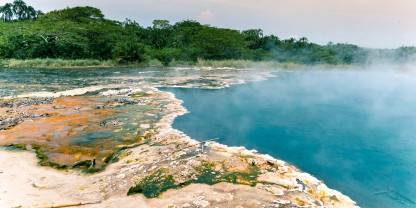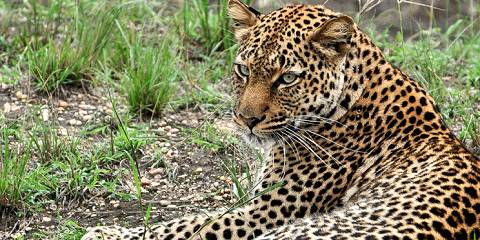Semuliki National Park protects one of Uganda’s most ecologically interesting forests. An extension of the Congolese Ituri Forest, it is named after the Semuliki (or Semliki) River, which flows northeast along the border with the Democratic Republic of Congo (DRC). The park is home to countless species that are associated with the Congo-Guinea region and have a limited range in East Africa, making it of particular interest to bird-watchers. Other attractions include a rich primate diversity and the impressive hot springs at Sempaya.

-
Best Time To Go
- December to March and June to August (Dry and early Wet seasons)
-
High Season
- June to September (But it is never busy)
-
Size
- 222km² / 86mi²
-
Altitude
-
652-760m /2,139-2,493ft
 View Photos
View Photos
 View Photos
+10
Photos
View Photos
+10
Photos
Pros & Cons
- Little visited and very undiscovered in feel
- East Africa’s only stronghold for lowland bongo and 12 other forest mammals
- Exceptional birdlife includes 35 species found nowhere else in East Africa
- Accessible from the town of Fort Portal on a good and very scenic surfaced road
- A great add-on to a stay at Toro National Park
- No accommodations inside or bordering the park
- Wildlife viewing and bird watching can be slow in the dense forest
Wildlife
Semuliki is a highly alluring destination to serious bird-watchers and other wildlife enthusiasts. A checklist of 435 bird species includes 35 Congo-Guinea specials recorded nowhere else in East Africa. Of the eight primate species active during the daytime, grey-cheeked mangabey, black-and-white colobus and red-tailed monkey are the most likely to be seen. Other large mammals are mostly very difficult to see but include hippo, forest elephant, forest buffalo, lowland bongo, water chevrotain and sitatunga.
Scenery
The thrilling descent road from Fort Portal to Semuliki runs along the foothills of the Rwenzori Mountains and is one of the most breathtaking anywhere in Uganda. The national park is dominated by an atmospheric jungle-like cover of lowland rainforest. A scenic highlight is the palm-fringed Sempaya Hot Springs, the largest of which shoots up to 2m/6.5ft into the air from a natural salt sculpture.
Activities
The popular and undemanding guided forest walk to Sempaya Hot Springs should offer some interesting bird and monkey sightings. Better suited to dedicated bird-watchers is the Kirumia River Trail. This route follows the river of the same name for 15km/9mi, passing a series of oxbow lakes, to where it joins with the Semliki River. The first 4km/2.5mi of this trail can be done as a day walk, but you need to be geared up for overnight camping to cover it all.
Weather & Climate
Semuliki is a lowland rainforest close to the equator, which means it is hot year-round and rain is possible at any time. January and February are the driest months. The weather and climate are broadly similar to the nearby Toro National Park (formerly Toro-Semliki Wildlife Reserve). More info:
Best Time To Visit Semuliki NP
Semuliki can be visited at any time of the year. However, the best time for wildlife viewing is during the Dry seasons (December to February and June to July) and the months that immediately follow them (March and August).
How To Get to Semuliki NP
The park headquarters at Sempaya lies 60km/37mi from Fort Portal along a scenic surfaced road that can be covered in under 90 minutes*. Fort Portal is also the closest town to Kibale National Park, so Semuliki can easily be visited as an extension of a trip there. Another good base for a visit is Semliki Safari Lodge in Toro National Park. The drive from here to Sempaya shouldn’t take more than 90 minutes*.
*Driving times are only a rough indication. You should always consider the possibility of significant delays.
Health & Safety
Please read our malaria and vaccinations page for Uganda, and our general ‘Wildlife Viewing Safety Precautions’ below for more info:




